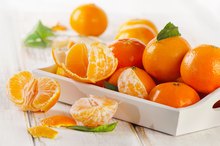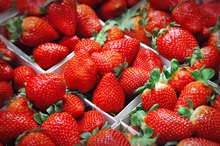What Fruits Contain Collagen?
Collagen is the most abundant protein in the human body. The collagen superfamily includes more than 20 different collagen types, which serve a structural function in the body. Collagen is found in the skin, connective tissues, blood vessel walls and in your eye. Collagen is rich in the amino acids proline and lysine. Vitamin C aids the formation of collagen. Though fruits do not contain collagen, fruits that supply protein or provide vitamin C furnish your body with the building blocks of this important structural protein.
Bell Peppers
In addition to its function in the formation of collagen, vitamin C helps protect cells from free radical damage. Bell peppers, a vegetable fruit, are an excellent source of vitamin C. One medium red pepper provides 380 percent of the daily value of vitamin C. Vitamin C is highly sensitive to temperature 2. Cooking peppers can result in a loss of over half of the vitamin C content. To maximize the vitamin C content of bell peppers, eat them raw.
- In addition to its function in the formation of collagen, vitamin C helps protect cells from free radical damage.
- Cooking peppers can result in a loss of over half of the vitamin C content.
Strawberries
Fruits That Heal Wounds
Learn More
Strawberries have more vitamin C, per serving, than most fruits, including citrus fruits. One cup of strawberries packs more than 150 percent of the daily value for vitamin C. Vitamin C functions in the cross-linking of collagen, which increases its tensile strength. This strengthens important tissues, including your bones and skin. Collagen also helps your skin retain its elasticity, keeping you looking younger for longer.
- Strawberries have more vitamin C, per serving, than most fruits, including citrus fruits.
- One cup of strawberries packs more than 150 percent of the daily value for vitamin C. Vitamin C functions in the cross-linking of collagen, which increases its tensile strength.
Lemons
Not only are lemons high in vitamin C, they have the most protein of all fruits. The higher a fruit’s protein content, the greater the amount of the amino acids, proline and lysine, which are used in collagen’s formation. One cup of lemon juice contains 128 percent of the daily value of vitamin C. Lemons contain 16 percent protein, twice the amount found in oranges and three times the protein in grapefruits.
- Not only are lemons high in vitamin C, they have the most protein of all fruits.
- One cup of lemon juice contains 128 percent of the daily value of vitamin C. Lemons contain 16 percent protein, twice the amount found in oranges and three times the protein in grapefruits.
Related Articles
References
- "Biochemistry"; Pamela C. Champe; 2005
- LiveStrong.com: MyPlate: Red Bell Pepper
- LiveStrong.com: MyPlate: Strawberries
- “Nutritive Value of American Foods in Common Units,” USDA Agriculture Handbook No. 456; USDA; 1975
- LiveStrong.com: MyPlate: Lemon Juice
- Enigmatic insight into collagen - PubMed
- The collagen family - PubMed
- Hydrolyzed Collagen-Sources and Applications - PubMed
- Hydrolyzed Collagen-Sources and Applications - PubMed
- Vitamin C in dermatology - PubMed
- Beneficial effects of food supplements based on hydrolyzed collagen for skin care (Review) - PubMed
- Collagen supplementation for skin health: A mechanistic systematic review - PubMed
- A Collagen Supplement Improves Skin Hydration, Elasticity, Roughness, and Density: Results of a Randomized, Placebo-Controlled, Blind Study - PubMed
- Oral Collagen Supplementation: A Systematic Review of Dermatological Applications - PubMed
- Fish Collagen Surgical Compress Repairing Characteristics on Wound Healing Process In Vivo - PubMed
- The wound healing potential of collagen peptides derived from the jellyfish Rhopilema esculentum - PubMed
- Natural composite dressings based on collagen, gelatin and plant bioactive compounds for wound healing: A review - PubMed
- Oral Collagen Supplementation: A Systematic Review of Dermatological Applications - PubMed
- Daily oral supplementation with collagen peptides combined with vitamins and other bioactive compounds improves skin elasticity and has a beneficial effect on joint and general wellbeing - PubMed
- Oral Intake of Low-Molecular-Weight Collagen Peptide Improves Hydration, Elasticity, and Wrinkling in Human Skin: A Randomized, Double-Blind, Placebo-Controlled Study - PubMed
- Effect of collagen supplementation on osteoarthritis symptoms: a meta-analysis of randomized placebo-controlled trials - PubMed
- Efficacy and tolerability of an undenatured type II collagen supplement in modulating knee osteoarthritis symptoms: a multicenter randomized, double-blind, placebo-controlled study - PubMed
- Improvement of activity-related knee joint discomfort following supplementation of specific collagen peptides - PubMed
- Improvement of activity-related knee joint discomfort following supplementation of specific collagen peptides - PubMed
- A calcium-collagen chelate dietary supplement attenuates bone loss in postmenopausal women with osteopenia: a randomized controlled trial - PubMed
- Effects of 12 Weeks of Hypertrophy Resistance Exercise Training Combined with Collagen Peptide Supplementation on the Skeletal Muscle Proteome in Recreationally Active Men - PubMed
- Collagen peptide supplementation in combination with resistance training improves body composition and increases muscle strength in elderly sarcopenic men: a randomised controlled trial - PubMed
- Oral supplementation with specific bioactive collagen peptides improves nail growth and reduces symptoms of brittle nails - PubMed
- Lack of Collagen VI Promotes Wound-Induced Hair Growth - PubMed
- Hydrolyzed Collagen-Sources and Applications - PubMed
- Biochemistry, Collagen Synthesis - StatPearls - NCBI Bookshelf
- Type III collagen is crucial for collagen I fibrillogenesis and for normal cardiovascular development | PNAS
- Effects of orally administered undenatured type II collagen against arthritic inflammatory diseases: a mechanistic exploration - PubMed
- Hydrolyzed Collagen-Sources and Applications - PubMed
- Collagen and gelatin - PubMed
- Symptomatic and chondroprotective treatment with collagen derivatives in osteoarthritis: a systematic review - PubMed
- Functional and bioactive properties of collagen and gelatin from alternative sources: A review - ScienceDirect
- Hydrolyzed Collagen-Sources and Applications - PubMed
- Significant Amounts of Functional Collagen Peptides Can Be Incorporated in the Diet While Maintaining Indispensable Amino Acid Balance - PubMed
- A Collagen Supplement Improves Skin Hydration, Elasticity, Roughness, and Density: Results of a Randomized, Placebo-Controlled, Blind Study - PubMed
- Oral intake of specific bioactive collagen peptides reduces skin wrinkles and increases dermal matrix synthesis - PubMed
- Effect of the novel low molecular weight hydrolyzed chicken sternal cartilage extract, BioCell Collagen, on improving osteoarthritis-related symptoms: a randomized, double-blind, placebo-controlled trial - PubMed
- A calcium-collagen chelate dietary supplement attenuates bone loss in postmenopausal women with osteopenia: a randomized controlled trial - PubMed
- Specific Collagen Peptides Improve Bone Mineral Density and Bone Markers in Postmenopausal Women-A Randomized Controlled Study - PubMed
- Collagen peptide supplementation in combination with resistance training improves body composition and increases muscle strength in elderly sarcopenic men: a randomised controlled trial - PubMed
- Specific Collagen Peptides in Combination with Resistance Training Improve Body Composition and Regional Muscle Strength in Premenopausal Women: A Randomized Controlled Trial - PubMed
- Undenatured type II collagen (UC-II®) for joint support: a randomized, double-blind, placebo-controlled study in healthy volunteers - PubMed
- Safety and efficacy of undenatured type II collagen in the treatment of osteoarthritis of the knee: a clinical trial - PubMed
- Symptomatic and chondroprotective treatment with collagen derivatives in osteoarthritis: a systematic review - PubMed
Writer Bio
Adam Dave, M.D., has written both fiction and nonfiction since 1997. His most recent work, "The Paradigm Diet," a short course on applied nutrition, is available on Amazon. He holds a medical degree from Medical University of the Americas and trained in family medicine at the University of Colorado.








